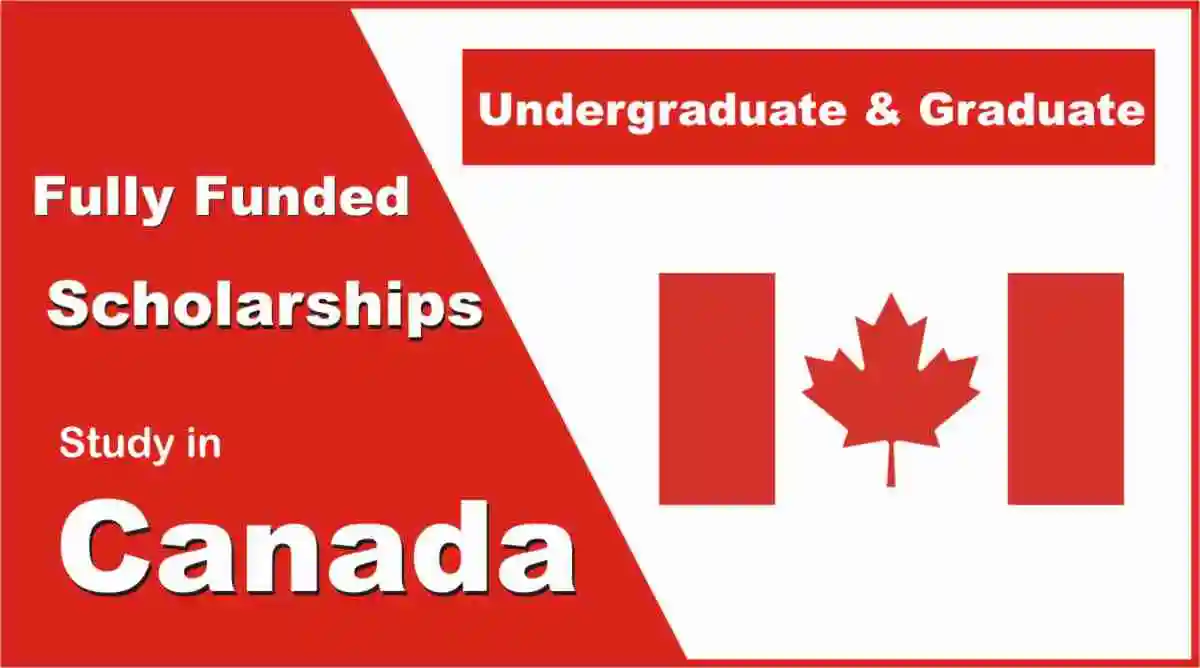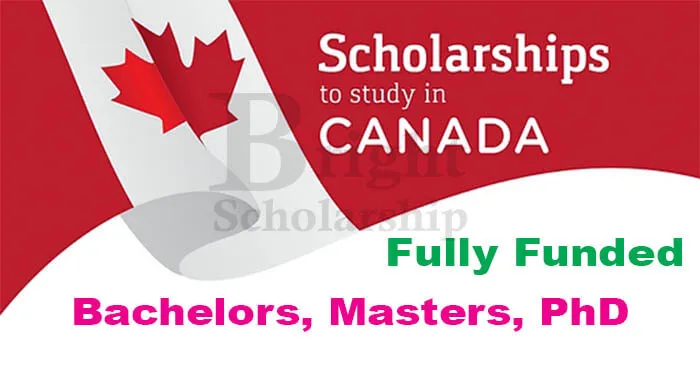Advertisements
Canada stands as a beacon of higher education excellence, attracting students from around the world with its renowned institutions, diverse culture, and unparalleled quality of life. For many aspiring scholars, the dream of studying in Canada may seem out of reach due to financial constraints. However, numerous fully funded scholarships provide avenues for talented individuals to pursue their academic ambitions in Canada without the burden of financial stress. In this comprehensive guide, we explore the landscape of fully funded scholarships in Canada, offering insights into eligibility criteria, application processes, and tips for success.
Understanding Fully Funded Scholarships
Fully funded scholarships represent a pivotal opportunity for individuals seeking to pursue higher education without the financial burden often associated with it. These scholarships cover not only tuition fees but also living expenses, travel costs, and sometimes additional expenses such as health insurance. Understanding fully funded scholarships entails grasping their significance, types, eligibility criteria, and application processes.
Types of Fully Funded Scholarships in Canada:
Fully funded scholarships in Canada come in various forms, each catering to different academic levels, fields of study, and eligibility criteria. Here are some common types of fully funded scholarships available for international students in Canada:
- Government Scholarships:
- Vanier Canada Graduate Scholarships: Offered by the Canadian government, these scholarships are awarded to doctoral students who demonstrate academic excellence, research potential, and leadership skills in the social sciences, humanities, natural sciences, engineering, or health sciences.
- Global Affairs Canada Scholarships: Administered by Global Affairs Canada, these scholarships aim to attract international students to Canadian institutions and foster global partnerships. They cover tuition fees, living expenses, and travel costs for eligible students.
- Institutional Scholarships:
- University-specific Scholarships: Many Canadian universities offer fully funded scholarships to exceptional international students based on academic merit, leadership qualities, or specific criteria set by the institution. Examples include the University of Toronto International Scholarships and the University of British Columbia International Leader of Tomorrow Award.
- Graduate Fellowships: Graduate schools and departments within universities may offer fellowships to support master’s or doctoral students in specific fields of study. These fellowships often cover tuition fees, stipends for living expenses, and research/travel grants.
- Private Scholarships:
- Corporate Scholarships: Some corporations in Canada offer fully funded scholarships to international students pursuing studies in fields related to their business interests. These scholarships may include internship opportunities or job placements upon completion of studies.
- Foundation Scholarships: Foundations and philanthropic organizations in Canada provide fully funded scholarships to support students with financial need or outstanding academic achievements. These scholarships may be targeted towards specific demographic groups, fields of study, or social causes.
- Research Grants and Fellowships:
- Canadian Institutes of Health Research (CIHR) Fellowships: CIHR offers fully funded fellowships to support doctoral students and postdoctoral researchers conducting health-related research in Canada. These fellowships cover stipends, research expenses, and travel grants.
- Natural Sciences and Engineering Research Council of Canada (NSERC) Grants: NSERC provides fully funded grants to support research projects in natural sciences and engineering fields. These grants may fund students’ research assistantships, equipment purchases, and conference attendance.
- International Exchange Programs:
- Rotary International Scholarships: Rotary International offers fully funded scholarships for international students to study abroad in Canada through its Global Grant program. These scholarships support graduate-level study or research in various academic disciplines.
- Merit-based Scholarships:
- Merit-based Awards: Some fully funded scholarships in Canada are awarded purely based on academic merit, without regard to financial need or specific fields of study. These scholarships recognize outstanding academic achievements and may cover tuition fees, living expenses, and other costs associated with studying in Canada.
These are just a few examples of the types of fully funded scholarships available for international students in Canada. It’s essential for prospective applicants to research and explore all available scholarship opportunities that align with their academic goals, interests, and eligibility criteria.
Eligibility Criteria:
The eligibility criteria for fully funded scholarships in Canada vary depending on the specific scholarship program, institution, or sponsoring organization. However, there are several common eligibility requirements that applicants typically need to meet. Here are some key eligibility criteria for fully funded scholarships in Canada:
- Academic Excellence:
- Most fully funded scholarships require applicants to demonstrate outstanding academic achievements, typically through high academic grades, GPA scores, or equivalent academic qualifications.
- Applicants may need to provide transcripts, certificates, or academic records from previous educational institutions to prove their academic excellence.
- Field of Study:
- Some scholarships may be specifically targeted towards students studying in certain fields or disciplines. Applicants must ensure that their chosen field of study aligns with the scholarship’s eligibility criteria.
- Certain scholarships may prioritize students pursuing studies in STEM (Science, Technology, Engineering, and Mathematics) fields or other high-demand areas.
- Level of Study:
- Fully funded scholarships may be available for undergraduate, master’s, doctoral, or postdoctoral studies. Applicants must verify the scholarship’s eligibility requirements to ensure they meet the appropriate level of study.
- Some scholarships may have restrictions based on the applicant’s current level of education or degree program.
- Nationality or Residency:
- Many fully funded scholarships in Canada are open to international students, while others may have restrictions based on nationality, residency, or citizenship.
- Some scholarships may be specifically targeted towards students from certain countries or regions, while others may be open to applicants from any country.
- Language Proficiency:
- Proficiency in the language of instruction (usually English or French) may be required for fully funded scholarships in Canada. Applicants may need to provide evidence of language proficiency through standardized language tests such as the IELTS, TOEFL, or DELF.
- Language proficiency requirements may vary depending on the scholarship program and the language policies of the host institution.
- Leadership and Extracurricular Involvement:
- Many scholarships value applicants who demonstrate leadership potential, community involvement, and extracurricular activities. Applicants may need to provide evidence of leadership roles, volunteer work, or participation in extracurricular activities.
- Letters of recommendation or personal statements may be required to demonstrate the applicant’s leadership qualities and extracurricular achievements.
- Research Experience (for Graduate Scholarships):
- Applicants for graduate-level scholarships, such as master’s or doctoral scholarships, may need to demonstrate research experience, academic publications, or contributions to their field of study.
- Research proposals or statements of purpose may be required to outline the applicant’s research interests, goals, and contributions to their academic field.
- Financial Need:
- Some scholarships may consider financial need as a criterion for eligibility. Applicants may need to provide evidence of their financial situation, including income statements, bank statements, or other financial documents.
- Financial need-based scholarships aim to support students who may not have the financial means to pursue higher education without external funding.
It’s essential for prospective applicants to carefully review the eligibility criteria for each fully funded scholarship they intend to apply for and ensure they meet all requirements before submitting their applications. Meeting the eligibility criteria is the first step towards securing a fully funded scholarship in Canada.
Application Process:
The application process for fully funded scholarships in Canada can vary depending on the scholarship program, sponsoring organization, and institution offering the scholarship. However, there are several common steps that applicants typically need to follow. Here is a general outline of the application process for fully funded scholarships in Canada:
- Research and Identify Scholarships:
- Begin by researching fully funded scholarships available in Canada that align with your academic goals, field of study, and eligibility criteria.
- Explore scholarship databases, university websites, government portals, and other resources to identify potential scholarship opportunities.
- Review Eligibility Criteria:
- Carefully review the eligibility criteria for each scholarship to ensure you meet all requirements before applying.
- Pay attention to specific requirements related to academic excellence, field of study, nationality, language proficiency, and other criteria.
- Prepare Application Materials:
- Gather all required documents and materials for the scholarship application, which may include:
- Academic transcripts, certificates, or diplomas from previous educational institutions.
- Standardized test scores (e.g., IELTS, TOEFL) to demonstrate language proficiency.
- Letters of recommendation from teachers, professors, or employers who can attest to your academic abilities and character.
- Personal statement or essay outlining your academic and career goals, reasons for applying for the scholarship, and how you plan to contribute to your field of study or community.
- Research proposal (for graduate-level scholarships) outlining your research interests, objectives, and methodology (if applicable).
- Financial documents (if required) to demonstrate financial need or funding sources.
- Gather all required documents and materials for the scholarship application, which may include:
- Complete the Application Form:
- Fill out the scholarship application form provided by the scholarship program or institution.
- Ensure that all sections of the application form are completed accurately and thoroughly, including personal information, educational background, and contact details.
- Submit Your Application:
- Follow the instructions provided by the scholarship program or institution to submit your application.
- Pay attention to application deadlines and ensure your application is submitted before the deadline expires.
- Some scholarships may require online submission through a scholarship portal, while others may accept applications via email or postal mail.
- Track Your Application:
- Keep track of your scholarship application to ensure it has been received and processed by the scholarship committee.
- Follow up with the scholarship program or institution if you have not received confirmation of receipt within the specified timeframe.
- Attend Interviews (if required):
- Some scholarship programs may require applicants to participate in interviews as part of the selection process.
- Prepare for interviews by reviewing common interview questions, practicing your responses, and showcasing your strengths and qualifications.
- Wait for Notification:
- Once you have submitted your application and completed any required interviews, wait for notification from the scholarship program or institution regarding the status of your application.
- Be patient during the selection process, as it may take some time for scholarship committees to review applications and make decisions.
- Accept Scholarship Offer:
- If you are selected as a scholarship recipient, you will receive an offer letter or notification of award from the scholarship program or institution.
- Follow the instructions provided to accept the scholarship offer and complete any additional requirements, such as signing scholarship agreements or providing additional documentation.
- Prepare for Departure:
- If your scholarship includes funding for travel or accommodation, make necessary arrangements for your relocation to Canada.
- Prepare for your academic studies by researching your chosen institution, arranging housing accommodations, and familiarizing yourself with Canadian immigration requirements.
By following these steps and carefully preparing your scholarship application, you can increase your chances of securing a fully funded scholarship in Canada and embarking on an exciting academic journey in one of the world’s top destinations for higher education.
Tips for Success:
Securing a fully funded scholarship in Canada is a competitive process, but with careful preparation and strategic planning, you can increase your chances of success. Here are some tips to help you navigate the scholarship application process and maximize your opportunities:
- Start Early: Begin your scholarship search and application process well in advance of deadlines. This will give you ample time to research scholarship opportunities, gather required documents, and prepare a strong application.
- Research Thoroughly: Take the time to research fully funded scholarships available in Canada that align with your academic goals, field of study, and eligibility criteria. Explore scholarship databases, university websites, and government portals to identify potential opportunities.
- Understand Eligibility Criteria: Carefully review the eligibility criteria for each scholarship to ensure you meet all requirements before applying. Pay attention to specific requirements related to academic excellence, field of study, nationality, language proficiency, and other criteria.
- Customize Your Application: Tailor your scholarship application to each specific scholarship program or institution. Customize your personal statement, research proposal (if applicable), and other application materials to demonstrate your fit for the scholarship and highlight your strengths and accomplishments.
- Seek Feedback: Seek feedback from mentors, teachers, or advisors on your scholarship application materials. They can provide valuable insights and suggestions for improving your application and making it more competitive.
- Highlight Your Achievements: Showcase your academic achievements, leadership experiences, extracurricular involvement, and community service activities in your application materials. Provide concrete examples and quantify your accomplishments wherever possible.
- Demonstrate Passion and Purpose: Clearly articulate your passion for your field of study, your career aspirations, and your reasons for applying for the scholarship. Show how receiving the scholarship will enable you to pursue your goals and make a positive impact in your field or community.
- Prepare for Interviews: If interviews are part of the selection process, prepare thoroughly by researching common interview questions, practicing your responses, and showcasing your strengths and qualifications. Be confident, articulate, and professional during the interview.
- Follow Instructions Carefully: Read and follow all instructions provided by the scholarship program or institution. Pay attention to application deadlines, submission requirements, and any additional documents or materials requested.
- Stay Positive and Persistent: Keep a positive attitude throughout the scholarship application process, and don’t be discouraged by setbacks or rejections. Stay persistent and continue seeking out new opportunities until you find the right scholarship match for you.
By following these tips and putting in the effort to prepare a strong and compelling scholarship application, you can increase your chances of success in securing a fully funded scholarship in Canada and pursuing your academic aspirations in one of the world’s top destinations for higher education.
Conclusion
In conclusion, fully funded scholarships in Canada offer invaluable opportunities for international students to pursue their academic goals and advance their careers in one of the world’s most renowned education systems. While the scholarship application process may be competitive and challenging, it is also incredibly rewarding for those who are successful.
Throughout this guide, we have explored the significance of fully funded scholarships, the types of scholarships available, eligibility criteria, the application process, and tips for success. From government-sponsored scholarships to institutional awards and private foundations, there are numerous opportunities for motivated and talented individuals to receive financial support for their studies in Canada.
Securing a fully funded scholarship requires careful planning, thorough research, and dedication to presenting oneself as a strong candidate. By understanding the eligibility requirements, customizing application materials, seeking feedback, and preparing thoroughly for interviews, applicants can enhance their chances of success.
Ultimately, fully funded scholarships not only provide financial assistance but also open doors to new academic and professional opportunities, foster cross-cultural exchange, and contribute to personal and intellectual growth. They enable students to pursue their passions, achieve their aspirations, and make meaningful contributions to their fields and communities.
Advertisements
As you embark on your journey to apply for fully funded scholarships in Canada, remember to stay focused, remain persistent, and stay true to your academic and career goals. With determination, perseverance, and a commitment to excellence, you can turn your dreams of studying in Canada into reality and take the first step towards a brighter future.
Advertisements






